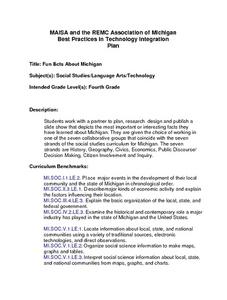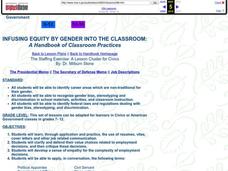Curated OER
Flags
Young scholars explore flags. In this social studies civics lesson students listen to Flags of the Metis by Calvin Racette. Young scholars identify examples of symbols used in the 21st century. Students research information about flags,...
Curated OER
Michigan Fun Facts
Fourth graders work with a partner to plan, rese,a rch design and publish a
slide show that depicts the most important or interesting facts they
have learned about Michigan. They are given the choice of working in
one of the seven...
Curated OER
Social and Cultural Issues in the Civil Rights Movement
Students examine the society and culture during the times of the Civil Rights movement. They view video clips and answer comprehension questions. They work together to research different authors and musicians sharing their information...
Curated OER
Moving Voices
Students create films in which they depict to others what they want them to know about their community or school. They create films with different themes including social studies, geography and government. They work together to produce...
Curated OER
Roman Society: Stoicism and Civic Duty
Students examine the causes and effects of the expansion of the Roman Empire. They identify the early strengths and the lasting contributions of the Empire itself. Using maps, they locate its geographic borders at the height of the...
Curated OER
Electoral Politics
High schoolers formulate their own opinions about the issues in an election campaign through a critical examination of political advertisements, candidate debates, and political cartoons.
Curated OER
By the People for the People
Students explore, using discussion, writing, and data collection, how different social factors affect civic participation and equality across the country and in their own school community.
Curated OER
Heroes
Learners explore heroic characters. In this philanthropy lesson, students discuss the characteristics of a super hero and then define vocabulary associated with philanthropy such as civic virtue and altruism. Learners work in groups to...
Curated OER
150 Years of Abolition in Pennsylvania
High schoolers study the struggle for abolition in Pennsylvania starting with the Quakers first protest through the burning of Pennsylvania Hall. They conduct research using primary source documents.
Curated OER
History of Miss America
Students make a time-lines of of decades using images from Miss America. In this history lesson, students looks at the country's beauty pageant and how it changes the lives of women in America. Students debate issues such as size...
Curated OER
Government: Government Intervention in Biomedical Research
Students are able to explain the role of government in protecting the rights of citizens. They participate in a lesson where they attempt to correct the ethical violations that were made in previous clinical trials such as the Tuskegee...
Curated OER
Time for Change? A look at Canada's electoral system.
Tenth graders cultivate respect and appreciation for Canadian Parliamentary democracy. They build curiosity and interest in studying citizenship issues related to Parliament and by engaging in a mock election.
Curated OER
The Rule of Law
Students examine the rule of law and government in this civics lesson. They discover the origins and how it impacts them on a daily basis. They also analyze its role in the judicial system.
Curated OER
Infusing Equity by Gender into the classroom
Students examine equality. In this civics lesson, students appoint committees for various offices then model a mock committee/application process in the classroom, followed by a discussion of whether equity was achieved or not and why.
Curated OER
Local Governments Don't Do Much ... Or Do They?
Learners study and explore their local government. They role play members of their City Council and various constituents as they discuss a variety of subjects typical of a city council meeting.
Curated OER
The Unseen Army: Conscientious Objectors During World War II
Learners study World War II and why it was called "the Good War". In this World War II lesson students identify the different kinds of conscientious objectors.
Curated OER
Progressive Movement in Kansas
Seventh graders examine the Progressive Movement in Kansas. In this Progressive Era lesson, 7th graders study various facts about this era in Kansas. Students create a presentation on a law that was passed during this time.
Curated OER
Common People of the American Revolution
Eleventh graders study the people of the American Revolution. For this American History lesson, 11th graders participate in a simulation that explains the different people of this time.
Curated OER
Kundun
Students study the country of Tibet. They watch the film Kundun and explore the life of The Dalai Lama and the recent history of Tibet. As they are viewing the movie they complete a series of study guide questions and discuss them as a...
Curated OER
Lives, Fortunes, Sacred Honor
Young scholars discover details regarding the signers of the Declaration of Independence. In this civics lesson, students read mini-biographies of some of the signers of the document. Young scholars then create a model of one of the 10...
Curated OER
Citizen Juries: Zacarias Moussaoui - May 1, 2006
Students consider deliberations by juries. For this citizen jury lesson, students complete readings regarding the constitutional right to a trial by jury as well as on the civic responsibility to serve on a jury.
Curated OER
MAPPING THE BLACK ATLANTIC
Students examine the geographic characteristics of Western and Central Africa, the impact of geography on settlement patterns, cultural traits, and trade. They compare political, social, economic, and religious systems of...
Curated OER
Wsshington Monuments Projects
Eighth graders choose a landmark or monument to investigate (individually or with a partner). After agreeing on items to study they research the landmark/monument and prepare a presentation.
Curated OER
Petition of Amelia Bloomer Regarding Suffrage in the West
Students investigate the role of Amelia Jenks Bloomer in the struggles for suffrage and political reform. They consider the factors involved in political socialization and compile webliographies of their research materials.

























